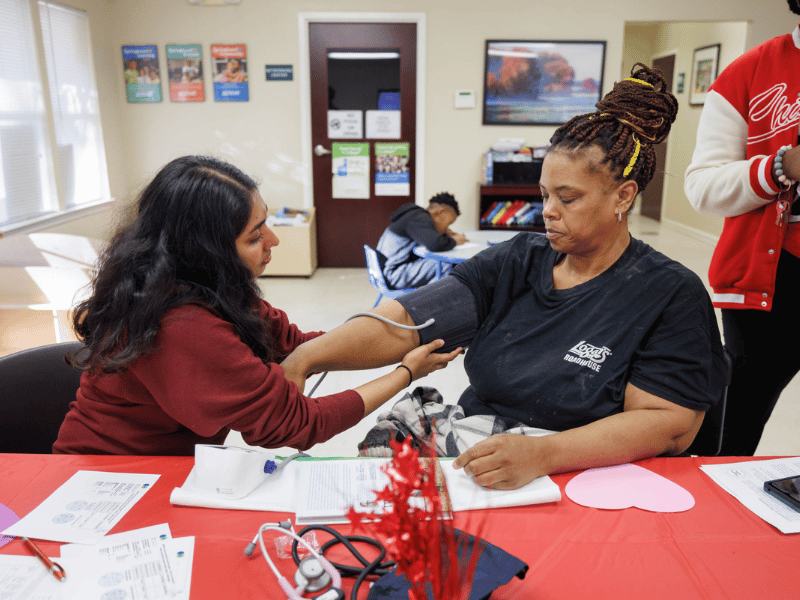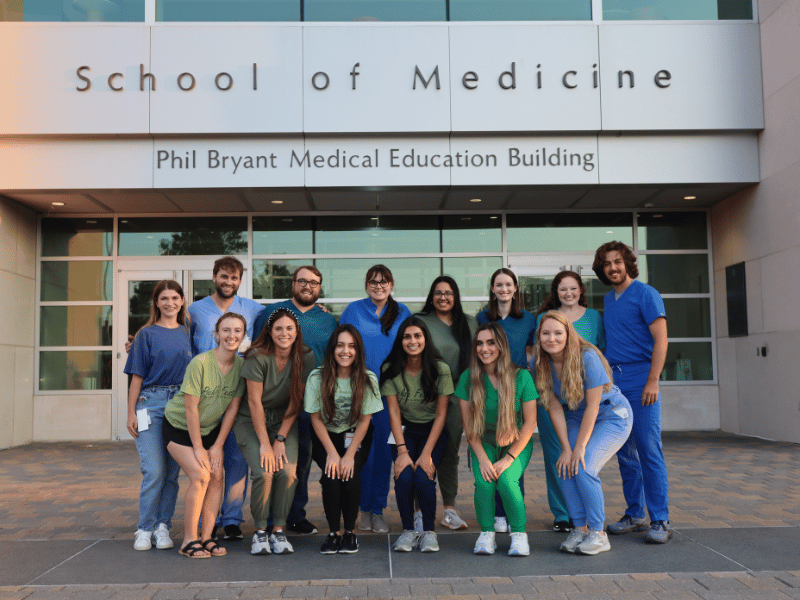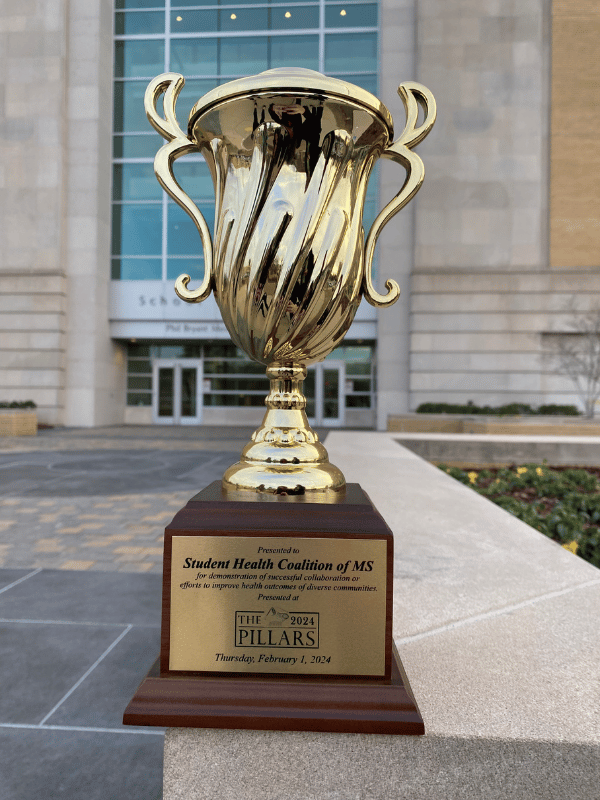Screenings, service and the Scooba Scramble: Meet the Student Health Coalition

On the afternoon before Valentine’s Day, Elaine Jones decided to take stock of her heart.
But she couldn’t drive herself to the doctor: “My car’s messed up at the moment,” said Jones, 50, of Jackson.
As it happened, she didn’t need her car or a ride from a friend to go get her blood pressure checked; all it took was a short walk to the clubhouse of her apartment complex.
“This really helps me out,” she said. “I’m glad they’re here.”
“They” were Alka Ghadiyaram and Kaia Horne from the University of Mississippi Medical Center, members of the Student Health Coalition of Mississippi: medical students who deliver free health screenings to Mississippians where they live and, at times, where they work.
“I love it,” said Jones, after Ghadiyaram had unfastened the blood pressure cuff from her arm at the Northwood Village Apartments clubhouse in Jackson, the site of one of this month’s SHC screening events.

Co-founded in the spring of 2022 by third-year medical students Isabella Kelly, SHC president, and Jordan White, vice president, the group has screened around 3,000 people so far, including nearly 1,800 last year. So far in 2024, they have reached more than 130 – a good start toward this year’s goal of 2,000.
Dr. Brian Williams, associate professor of preventive medicine, is the organization’s faculty advisor, but the students run it, performing health checks and sowing health information across the state – how to eat better, for instance.
“There’s a gap between the amount of information available and what many people who receive it are able to do with it,” said second-year medical student Shade Smith of Moorhead.
“So, we take with us calorie calculators and other charts and information with us in order to bridge that gap.”
Smith is executive operations officer for the SHC’s “Hometown” health checks, arranged by individual students in the town that brought them up or where they have family connections; it’s an essential part of their outreach.
And, beyond blood pressure scrutiny, they usually provide blood glucose monitoring, Body Mass Index (BMI) information and “The Dollar General Diner,” a collection of healthy recipes with ingredients at low, everyday prices.
“It comes with nutritionally-approved menus with ingredients that are available even in a food desert,” Smith said.
“Every ingredient can be found in a Dollar General, and the Jackson Free Clinic has held demos showing how to prepare the recipes.” The collection is downloadable with a QR code, and students will hand out the recipe book on request.
Assembled by M3 Mina Motakhaveri, the group’s nutrition director, the cookbook could also be called “Eating Mississippi,” with offerings such as Okolona Oats, the Booneville Breakfast Burrito, the Tasty Tupelo Parfait and the Scooba Scramble.
“This is why I joined the coalition,” Smith said. “I’m from Sunflower County; it’s like many other places in Mississippi. There may not be a grocery store in Isola, for instance, but they have a Dollar General.”
For her part, Ghadiyaram, the Valentine’s Day Eve screener and M1 representative for the SHC, joined up because “I like meeting people where they are, seeing where they live,” the Olive Branch native said.
“You don’t really know much about a person’s life until you go to them and see what they’re going through – like the people of Rolling Fork, where I went recently. It’s almost a year after the tornado but people there are still being affected by the damage.
“It’s sad to see, but it’s good to be aware, and to go there and talk to them about their health and ask how they’re doing.
“Sometimes, though, when it comes to people’s health, we find that some aren’t even aware that something is wrong.”
Chances are pretty good that something is wrong, somewhere. For instance, as of 2021, Mississippi recorded the country’s highest rate of deaths from hypertension: 20.4, an increase of about 23 percent over the previous decade. The next-highest was Nebraska’s, at 16.7.
But the students are not diagnosticians; they can’t say, for instance, “you have high blood pressure.” They can say, “you may need to see a doctor.”
“At each event is a log that can be used to calculate what health issues a person is encountering – what they need to see a doctor about,” said M2 Grace Howell of Liberty.
“They can take log with them and show it to the doctor or health clinic they usually visit.”
All SHC members – an estimated 300 volunteers – are trained through the Community Health Advocate manual written by Dr. Rick deShazo, UMMC professor emeritus of medicine.
They have summoned that know-how in around 41 of Mississippi’s 82 counties, Howell said, and plan to mobilize their cuffs, monitors, calculators and Dollar General blue plate specials in the remaining 41.
“One of our goals is to focus on rural areas, including expanding more into the Delta,” said Simmi Kaur of Clinton, an M2 who helped the SHC start vision and hearing screenings for children last summer. Working with Dr. Lisa Haynie, professor of nursing instruction in the School of Nursing, the medical students have performed around 100 tests in elementary schools.
“We are also trying to compile a list of primary care physicians at event locations and distribute the list to people who are screened,” said Kaur, who shares the title of executive operations officer-communications with Howell.
“At every place you go to, you make connections with people there. And, afterward, I feel so uplifted.”

The students’ work is noticed: The group, which has just been granted nonprofit status, earned the Esprit De Corps Award from the Pillars at UMMC, which recognizes service to others, especially in diverse and underrepresented communities.
And they’ve made a big impression on many a faculty member with their "Pie a Professor" fundraiser.
The students don’t work in a vacuum, though. They’ve formed partnerships, including arrangements with local housing coalitions. They have an ambassador program, which forges relationships with other Mississippi colleges and universities, encouraging them to sponsor their own screenings: Kaia Horne, for instance, is the Ole Miss ambassador director.
They will appear at community gatherings, such as health fairs, staged by other organizations, and set up screenings there, as they have done with the Choctaw Health Center near Philadelphia.
Similarly, the February 13 screenings at Northwood Village Apartments coincided with a children’s pizza party coordinated by Springboard to Opportunities, which connects affordable housing residents with community resources. It was also tied to the Jackson Heart Study, an investigation of cardiovascular disease among African Americans.
People agreed to enroll in the study after they had their blood pressure monitored; apartment resident Gerrianesha Thomas said she was happy to do both.
“Mine was a little higher than usual,” Thomas, 26, said, “but people need to get their blood pressure checked. This is good for everybody.
“I wish the students could come here more often. And I wish they could have checked my weight, too.”
STUDENT HEALTH COALITION OUTREACH, 2023
- Total people screened: 1,771
- Blood pressure: 1,533
- Blood glucose: 1,151
- Prediabetes: 321
- BMI: 410
- Pediatric: 120


